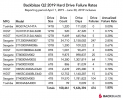USB interface is a waterloo of digital audio in my experience. The USB implementation in Ares2 is good but Gungnir Multibit had a relatively better implementation. Since Ares2 was much better than Cxn v2 DAC not details wise but tonality and soundstage wise, I was quite impressed with ares2 ; I thought there's no need to invest in USB noise reduction via cables, devices etc.
But, since Cxn v2 has a digital out as well, once I connected my PC to Cxn v2 via USB and connected the digital out of Cxn to Ares2. Bingo.. It was much superior to connecting directly to Ares2. The noise floor was reduced so much that there was improvement in whole of the frequency range. Cxn v2 was acting as USB to Coax converter and it was great at that job too. Ares2 accepts dsd/hires via Coax so there was no issue whatsoever.
Ipurifier 1 - ipurifier 2 -now ipurifier 3..
USB Regen - Iso Regen, curious cables, lush cables...
PS audio, Audioquest & all major hifi Manfacturer have usb jitter suppression solutions catering to various budgets. Many Expensive DACs like Audionote skip on USB input options, so avoid USB if avoidable IMHO.


